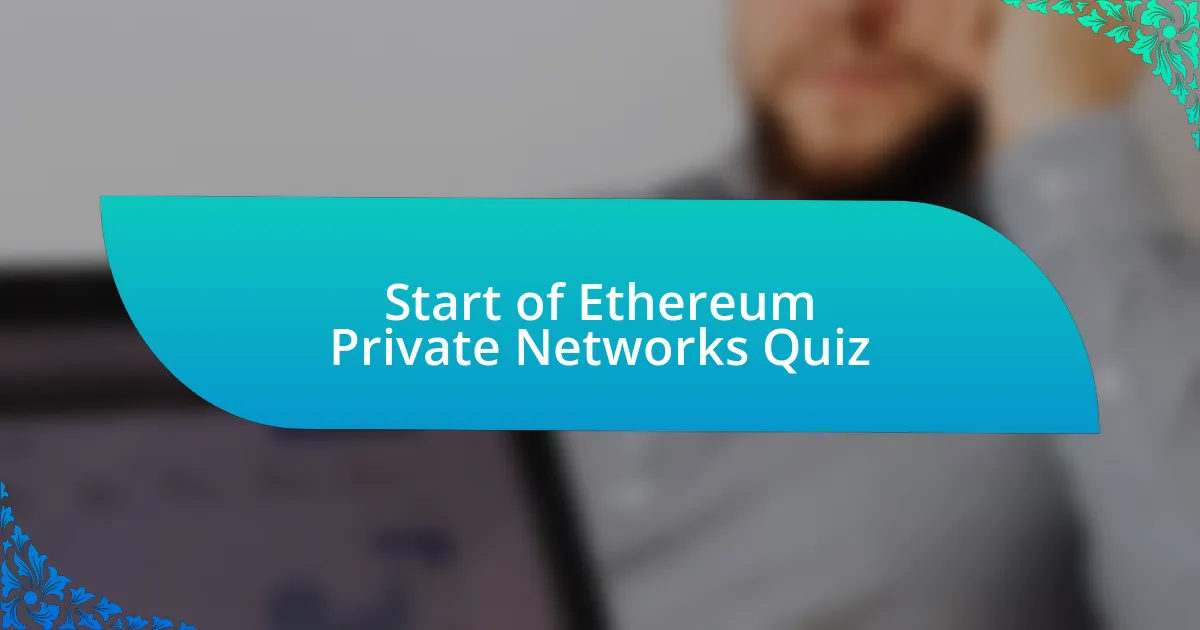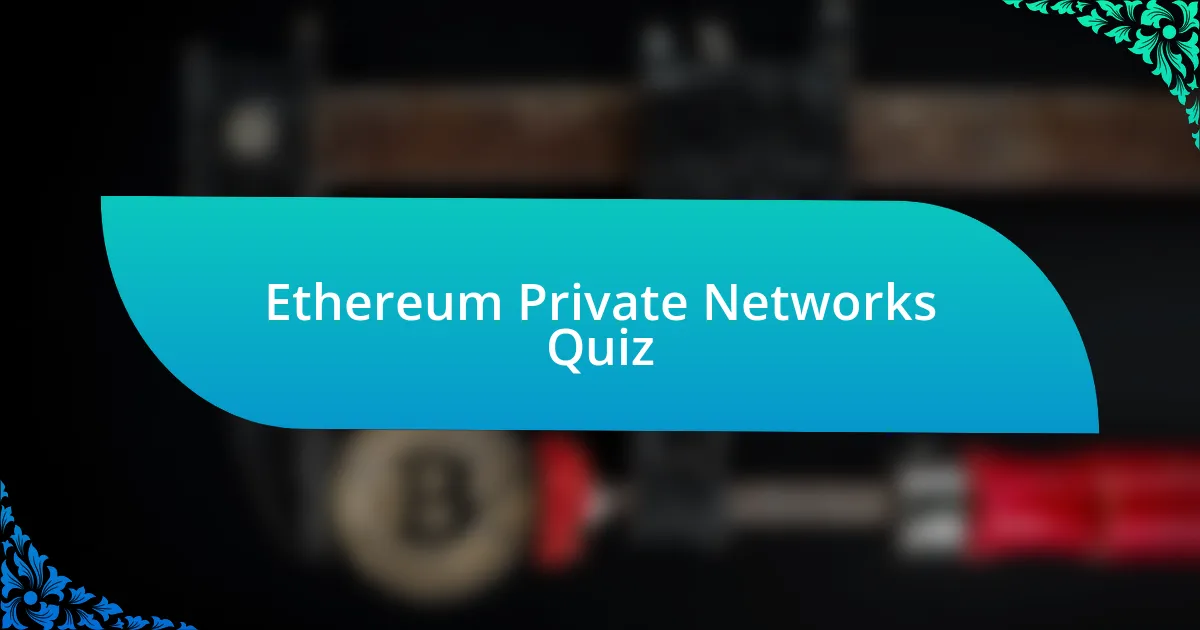
Start of Ethereum Private Networks Quiz
1. What is a private Ethereum network?
- A private Ethereum network is solely for cryptocurrency trading among the public.
- A private Ethereum network allows all public blockchain transactions to be visible.
- A private Ethereum network operates with unlimited nodes connected from all regions.
- A private Ethereum network is composed of multiple Ethereum nodes that can only connect to each other, not to the main Ethereum network.
2. Why are private Ethereum networks useful?
- Private Ethereum networks are slower than public ones.
- Private Ethereum networks allow for secure testing and data privacy.
- Private Ethereum networks can be accessed by anyone.
- Private Ethereum networks lack any security features.
3. How do you set up multiple Geth nodes for a private network?
- Each Geth node requires a separate data directory (–datadir) and a common consensus algorithm.
- All Geth nodes must share the same data directory for synchronization.
- A separate folder for each node is not necessary; they can operate from a single folder.
- Geth nodes need to connect to the Ethereum mainnet for validation.
4. What is the purpose of the –netrestrict flag in Geth?
- The –netrestrict flag allows public access to all IPs.
- The –netrestrict flag enhances transaction speed significantly.
- The –netrestrict flag configures a whitelist of IP networks.
- The –netrestrict flag is used for wallet encryption.
5. How do you configure Geth to restrict peer-to-peer connectivity to an IP subnet?
6. What is Enterprise Ethereum?
- Enterprise Ethereum is a private variation of the Ethereum blockchain designed for enterprise use, offering features like high scalability, performance, permissions, privacy, and governance.
- Enterprise Ethereum is a public version of the Ethereum blockchain focused on cryptocurrency trading and mining.
- Enterprise Ethereum is an outdated protocol that has been replaced by newer blockchain technologies.
- Enterprise Ethereum is a social media platform built on Ethereum technology for content creators.
7. How does Enterprise Ethereum achieve privacy?
- Open public transactions
- Transparent consensus mechanism
- Private P2P transactions
- Unrestricted data sharing
8. What are the key features of Enterprise Ethereum?
- Restricted access with no governance features
- Unlimited transaction speeds but no privacy
- High scalability, performance, permissions, privacy, and governance
- Public transaction transparency and open accessibility
9. How does Enterprise Ethereum differ from public Ethereum?
- Enterprise Ethereum operates only on public networks for transparency.
- Enterprise Ethereum is completely open to all users without restrictions.
- Enterprise Ethereum does not allow scalability for enterprises using it.
- Enterprise Ethereum uses permissioned networks for added privacy.
10. What is the role of the Enterprise Ethereum Alliance?
- It limits Ethereum to personal use only.
- It develops public applications for everyone.
- It extends public Ethereum with add-ons for enterprise use.
- It manages Ethereum`s cryptocurrency prices.
11. What is the purpose of a genesis block in a private Ethereum network?
- A genesis block acts as a storage unit for all smart contracts deployed on the private network.
- A genesis block primarily serves to manage transaction fees on the private network.
- A genesis block functions as a way to track user accounts in the Ethereum network.
- A genesis block initializes the blockchain and is needed to create a private blockchain, setting an arbitrary number that is not equal to the identifier of existing networks.
12. How do you create a genesis block for a private Ethereum network?
- Set the networkid to 1 to match the main Ethereum network.
- Use the default networkid that comes with Geth installation.
- Replace the networkid with an arbitrary number not equal to the identifier of existing networks.
- Create a genesis block by connecting to the public Ethereum network.
13. What is an Externally Owned Account (EOA)?
- An EOA is a public account that does not require keys to access or perform transactions.
- An EOA is managed solely by automated systems without human interaction.
- An EOA is controlled by an external party or person, accessed through private keys, contains Ether balance, and can send transactions and trigger contract accounts.
- An EOA is a type of smart contract account created for decentralized applications.
14. How do you create an EOA in Geth?
- Run Geth in two windows to manage the blockchain network and create an EOA.
- Install Ethereum on a virtual machine and run a test network.
- Use the –reset flag to reset existing accounts and create a new one.
- Create a smart contract to automatically generate an EOA.
15. What is the purpose of using a separate folder for a private Ethereum network?
- To allow for unlimited node connections
- To increase the overall speed of the network
- To keep your Ethereum private network files separate from public files
- To eliminate all fees associated with transactions
16. How do you set up a private Ethereum network using Geth?
- Use a cloud service to run all nodes online and ignore directory structures.
- Set up one Geth node on any public network without creating a genesis block.
- Install Geth, create a separate folder, create a genesis block, and run Geth in two windows to manage the blockchain network.
- Only run a single instance of Geth without setting up any folders.
17. What is the significance of the –datadir flag in Geth?
- The –datadir flag sets the maximum gas limit for transactions in Geth.
- The –datadir flag specifies a separate data directory for each Geth node in a private network.
- The –datadir flag enables automatic synchronization with the main Ethereum network.
- The –datadir flag allows the use of multiple consensus algorithms in Geth.
18. How do you ensure that nodes in a private Ethereum network can only connect to each other?
- Use a custom programming language for smart contracts.
- Use the –netrestrict flag to restrict peer-to-peer connectivity to an IP subnet.
- Increase the block size to limit connectivity.
- Apply a password to each node for enhanced security.
19. What is the difference between shielded public transactions and private channels in Enterprise Ethereum?
- Shielded public transactions require consent, while private channels are fully open to the public.
- Shielded public transactions are validated by the network, while private channels use zero-knowledge proofs for confidentiality.
- Shielded public transactions allow full visibility, while private channels invite all participants.
- Shielded public transactions depend on public keys, while private channels only require user names.
20. What is Project Ubin?
- Project Ubin is a cryptocurrency trading platform for public transactions.
- Project Ubin is a collaborative Ethereum project that used zero-knowledge proofs to enable interbank payment networks without revealing transaction information.
- Project Ubin is a game development framework for creating Ethereum-based games.
- Project Ubin is a social media application built on the Ethereum network.
21. How does Project Ubin achieve privacy in transactions?
- Project Ubin gains privacy through a centralized control system that limits access to transaction details.
- Project Ubin ensures transaction privacy by using a public ledger that is entirely unencrypted.
- Project Ubin achieves privacy by anonymizing all user wallets, hiding their identities completely.
- Project Ubin uses zero-knowledge proofs to enable the transfer of digital assets without revealing information about balances or transaction amounts.
22. What are the requirements for business networks to succeed?
- Business networks should prioritize customer service over technology integration.
- Business networks need resilience, interoperability, permissioning, and privacy to succeed.
- Business networks must focus solely on profitability and sales metrics.
- Business networks only require public access for growth and marketing.
23. Why is the Ethereum blockchain a powerful enterprise solution?
- The Ethereum blockchain is limited in scalability and primarily focuses on public transactions, making it weak for enterprise solutions.
- The Ethereum blockchain lacks the necessary privacy features and is not suitable for secure enterprise use.
- The Ethereum blockchain primarily serves as a decentralized currency and does not cater to enterprise requirements effectively.
- The Ethereum blockchain offers granular privacy layers and a public-first approach, making it a powerful enterprise solution for organizations needing flexibility and global reach.
24. What is the role of the Monetary Authority of Singapore in Project Ubin?
- The Monetary Authority of Singapore collaborated with Consensys to create an interbank payment network using zero-knowledge proofs in Project Ubin.
- The Monetary Authority of Singapore developed a decentralized exchange for Project Ubin.
- The Monetary Authority of Singapore focused on regulating cryptocurrencies in Project Ubin.
- The Monetary Authority of Singapore issued new fiat currency for Project Ubin.
25. How does Enterprise Ethereum address scalability issues?
- Enterprise Ethereum addresses scalability issues by allowing customization of network size, block size, and gas limit, making it suitable for closed environments with minimal participants.
- Enterprise Ethereum resolves scalability issues by using a single centralized server to manage all transactions effectively.
- Enterprise Ethereum improves scalability by requiring all transactions to be validated by every node in the network simultaneously.
- Enterprise Ethereum tackles scalability problems by implementing a public access model for all users in a public blockchain setting.
26. What is the significance of the Enterprise Ethereum Alliance in the context of enterprise solutions?
- The Enterprise Ethereum Alliance limits blockchain use to small businesses only.
- The Enterprise Ethereum Alliance solely focuses on improving public Ethereum transactions.
- The Enterprise Ethereum Alliance creates regulations for all Ethereum users.
- The Enterprise Ethereum Alliance promotes collaboration and innovation in enterprise blockchain solutions.
27. How does Enterprise Ethereum ensure transaction privacy?
- Private transactions and private consortia
- Open transactions for everyone
- Public transactions without encryption
- All transactions are stored on public ledger
28. What is the main difference between permissioned and permissionless blockchain networks?
- Permissionless blockchain networks require identity verification for all users.
- Permissioned blockchain networks can only be accessed through private keys.
- Permissioned blockchain networks are controlled by specific entities, while permissionless networks are open to anyone.
- Permissionless blockchain networks are usually slower than permissioned ones.
29. How does Enterprise Ethereum handle high transaction speeds?
- Enterprise Ethereum manages high transaction speeds by reducing the number of transactions allowed per second.
- Enterprise Ethereum can handle high transaction speeds by customizing the network size, block size, and gas limit.
- Enterprise Ethereum handles high transaction speeds by using a single, large block for all transactions.
- Enterprise Ethereum can only handle high transaction speeds by increasing gas prices across all nodes.
30. What is the role of Project Khokha in the context of private data management?
- Project Khokha uses Pedersen commitments for secure data management.
- Project Khokha allows unrestricted access to data across networks.
- Project Khokha focuses solely on blockchain scalability issues.
- Project Khokha enables public transactions to enhance transparency.



